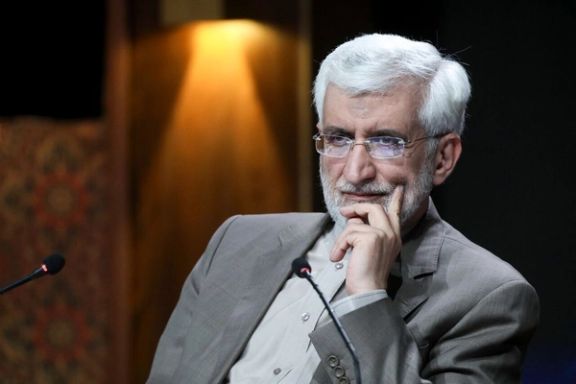

The Islamic Republic should close the Strait of Hormuz in the Persian Gulf and build a nuclear bomb, Iran's ultra-hardliners have been demanding on social media in the wake of Israel’s killing of Hassan Nasrallah.
In recent days, ultra-hardliner social media activists, largely supporters of former nuclear negotiator Saeed Jalili, have been criticizing President Masoud Pezeshkian and his government for their "inaction" against Israel, despite its recent deadly operations in Gaza and Lebanon. They have suggested that Iran is avoiding confrontation with Israel.
Ultra-hardliners have, however, remained conspicuously silent on the fact that the decision to launch a military response against Israel ultimately rests with Supreme Leader Ali Khamenei, as commander-in-chief of the Armed Forces, not with the president or parliament.
In a series of X posts Saturday after Nasrallah’s demise was confirmed, Khamenei called on all Muslim nations to stand by the people of Lebanon but fell short of vowing revenge by Iran for his killing and the killing of Ismail Haniyeh in Tehran in July as hardliners and ultra-hardliners had expected.
“Only breaking red lines [by us] can stop [the enemy from] breaking [our] red lines,” a Jalili supporter tweeted while suggesting that the Islamic Republic should end its so-called “strategic patience” and build a nuclear bomb, threaten to leave the UN and refuse to allow the passage of Western commercial vessels through the Strait of Hormuz for a week by holding a week-long naval drills.

“Why can Yemen block the main passageway of oil [in the Bab al-Mandab Strait] but we are not doing the same in the Strait of Hormuz?” an ultra-hardliner asked in a tweet Saturday.
Another ultra-hardliner suggested that Iran must target the economic interests of the Western, Israeli, and Arab countries in the region before taking any other action.
“Iran's first step should be closing this strategic passageway to prevent an all-out war in the region,” he tweeted while suggesting that failing to take such a step may bolden Israel to make the “strategic mistake” of attacking Iran.
Iranian officials have on many occasion in the past threatened to close the Strait of Hormuz, but this can lead to a clash with the US and other naval forces, leading to a regional war.
“Whether we like it or not, Iran must direct its military doctrine towards building a nuclear bomb. Iran has wasted the cards it held in the past and the only card that it holds now is a nuclear bomb. This is the only means to bring the West to the negotiation table,” Sohrab Salehi, a university professor of medicine who also supports ultra-hardliners on social media tweeted Saturday.
“You gentlemen in charge, one must have nuclear power against such an enemy. Test the first nuclear bomb for the sake of Iran's security and in reaction to the actions of the notorious regime [of Israel],” Mohammad-Mehdi Dehghannejad, an ultra-hardliner social media activist tweeted.
These demands have drawn criticism from other netizens, who argue that closing the Strait of Hormuz would only escalate tensions. They also point out that building a nuclear bomb, despite the official claim that Khamenei has issued a religious ban on weapons of mass destruction, including nuclear arms, would not shield the Islamic Republic from Israel.
“In the highly unlikely case that we succeed [in building a bomb], how can a system that can’t protect its highest officials manage to guard that bomb? Or let’s say you built it...how are you going to make a deal using the nuclear bomb card?” a netizen on X asked the advocates of Iran becoming nuclear to protect itself against Israel.
A netizen on X contended that ultra-hardliners will brag about the closure of the Strait of Hormuz for some time but their ruckus will soon be forgotten as in the past.
Meanwhile, Abdolreza Davari, a former ultra-hardliner and close confidante of Mahmoud Ahmadinejad, who supported Pezeshkian over Saeed Jalili in the presidential election, offered a surprising assessment of the situation and Hamas's role in it following Nasrallah’s death.
Highlighting the upcoming anniversary of the October 7 attack that ignited the latest round of conflict, Davari argued in a tweet that an analysis of the “cost-benefit of the operation and its impact on the Resistance Front and the Zionist enemy” reveals that the operation resulted in “nothing but pure damage.”
In another tweet, Davari suggested that Iran should reassess the factors behind the “devastating blow” to the Resistance Front and prioritize “pursuing Iran's interests” in line with the shifting dynamics of the region in the post-Nasrallah era.